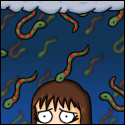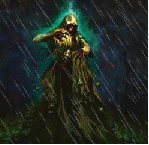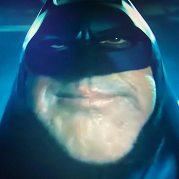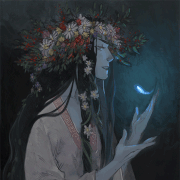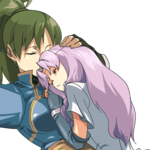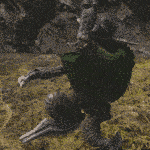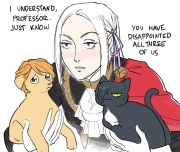|
Onmi posted:As someone who needs anti-depressants to function, who's lost his father etc. lotta regrets, the themes of the story resonated hard for me. And while you're not wrong about the support and fundamental character-building strength... That's not what the game isn't saying. Radz-at-han is an entire SOCIETY based around neighbours coming together to work for a common goal, the Ilsabard Contingent, literally the 10+ minute cutscene where they go over every external thing you've done in the game from raids to loving Eureka, and showing how everyone comes together holy poo poo the Scions are founded on people, multiple times, coming together and bonding through shared trauma. Both Minfilia's Scions after the Circle of Knowing to Alphinaud after the Bloody Banquete. I don't disagree with you - the game definitely emphasizes how important community is when it comes to combating despair. Emzedoh posted:I can't say I'm fond of the reading that says suffering is good for you actually. Like, eat your suffering kids, it'll make you big and strong! I think the better takeaway is the idea that suffering is inevitable and must be borne with dignity. I don't really think the game was about how suffering was good, either - sorry if my post gave that impression. I think a lot of things in these conversations get lost in the phrasing and abstraction of ideas. Rather, like you said, it's more about how suffering is inevitable, and thus it's better to live a life immersed in that reality than dwelling in a comfortable bubble in which suffering isn't overtly present for a time, because doing so only makes you helpless when that bubble is punctured or revealed to be founded on false pretenses. I guess it's this that I disagree with, or rather can't quite accept the premise of. My experience is that people who have lived in bubbles like that - who have experienced life in an "immature" way - don't really respond especially better or worse to sudden tragedy than people who haven't, and it mostly comes down to other crap. And people who have already endured loss aren't necessarily stronger when the next loss comes. To put it in the game's terms, the narrative around Meteion's question, "why do we bother to live when life fundamentally sucks?" is obviously that it can only be answered by people who have experienced and accepted that life does suck over a long period of time, and can then turn and say, "regardless of the bad parts, I have still found reasons to live". But I suppose the idea that the Sundered people would be able to find this acceptance in a way the Unsundered wouldn't didn't feel based in anything that felt fundamentally truthful to me. More broadly, I feel like no human can ever reach a state of total acceptance of suffering, but only an imperfect stability, and that everybody is ultimately at the mercy of their circumstances when it comes to being able to accept reality. It felt like the narrative wanted to sell me on a binary between embracing the world (embodied in the Scions and their allies) and rejecting it (embodied in the Ancients and the races of Ultima Thule) that just isn't so simple. I have this kind of response to a lot of 'you must keep moving forward!' stories and always have, so I won't act like this is some semi-objective flaw with Endwalker in the way I did with the more technical parts of the plotting; it's just my mode of thinking. And besides, I don't want to get into another argument in this thread. PoorWeather fucked around with this message at 11:36 on Jan 23, 2022 |
|
|
|

|
| # ? Jun 13, 2024 02:12 |
|
It is entirely possible to look at what is presented and extract the ideas that the narrative is about holding on to hope in the face of tremendous pain and difficulty and putting everything you have into rising above it because you can, that suffering is necessary and important and grows you as a person as an intrinsic part of the human experience, and that you don't have any choice but to deal with it anyway and must accept it. They are not mutually-exclusive and all are present, and how people feel about these ideas will depend on their own worldviews and experiences and the context of their presentation. I personally found Ultima Thule inspiring in the way all these dead societies sprang back to life by the simple act of trying to face their pains and disappointments. I found Hydaelyn trying to extract value from suffering by saying it had made us strong aggravating. Endwalker tries to provide its own answers and reassurances about a shared element of the human condition, it's natural and okay for different people to agree or disagree with some of its conclusions or find grounds to criticize how it tries to make them. Jetrauben posted:In all seriousness I think that the events of the last few years have told very much on a lot of people and that's part of why the "Suffering is necessary/good for you/makes you stronger" theodicy is something some people react so badly to. I think a lot of criticism stems from people seeing that last part in the actual text and having that color everything else about it for them in a way it might not have some years ago. Ironslave fucked around with this message at 11:41 on Jan 23, 2022 |
|
|
|
Yeah, I think the conflict isn't about Ultima Thule or the recognition that untreated despair and depression are deadly in times of tremendous suffering. It's specifically about how well people respond to the theodicy Hydaelyn flirts with where misery and pain - not just strife or disagreement - are not only present but can never be defeated, that we live in the best of all possible worlds. God knows I don't feel stronger or more capable of true happiness after the last couple incredibly trying years. I feel barely holding on and in desperate need of "better times." Maybe that's an aspect of it, too, I find the theodical take to unjustly validate Hermes' and Meteion's morbid depression. Jetrauben fucked around with this message at 11:51 on Jan 23, 2022 |
|
|
|
I read what Hydaelyn was saying as a sort of lemonade from lemons situation; all of our woes and sufferings, though they weren't good, have also made us strong enough to overcome this, in some ways the ultimate suffering. I figure Hydaelyn's own actions make her philosophy clear. It is not far from this theodical take to say "and perhaps the right kind of suffering will lead to the most growth," and thus to cultivation of certain kinds of suffering and so on. This would have probably taken the form of engineering trials that we had to deal with, and Hydaelyn never does that except for the very last trial, which is pretty explicitly "if you ain't hard enough to beat me, you sure ain't hard enough to take my mothercrystal and beat the bird." Though Midgarsormr kind of does, and Midgarsormr might have his own opinions on all of this poo poo. An interesting topic if he ever opts to stop being dead, Kroak style.
|
|
|
|
|
I think it's significant that Hydaelyn requires us to defeat her in order to progress. She's a figure who escorts the hero to victory and all, but also we literally have to fight her and destroy her in order to progress in the way we need to. Like, she is absolutely presented as admirable and heroic, but also it's fair to say she can't answer the final question herself right? By the end, the magical power of friendship carrying our party flies in the face of the "all must suffer" stuff by having the heroes completely win without any losses (except Zenos, which even he had a happy ending if you think about it)
|
|
|
|
I think the point of EW (and of buddhism that probably inspired it to some extent) is not that 'suffering is good', but that 'trying to avoid suffering is impossible and it will eventually backfire'. Meteion rejected suffering and thus life, Ancients/Ascians were unable to deal with loss and desperately tried to revert it, dragons gave up hope and resigned to their fate and so on.
|
|
|
|
Dwesa posted:I think the point of EW (and of buddhism that probably inspired it to some extent) is not that 'suffering is good', but that 'trying to avoid suffering is impossible and it will eventually backfire'. Meteion rejected suffering and thus life, Ancients/Ascians were unable to deal with loss and desperately tried to revert it, dragons gave up hope and resigned to their fate and so on. Something I learned in the NGE and Madoka fandoms and am re-learning again with this game is that I'm probably not a Buddhist. Strap me into the meaningless utilitarian escapist pleasure machine. Shove those Odyssian lotuses into my mouth loving right now, please. Cleretic posted:This was basically outright said by Venat, in fact, in the post-Elpis cutscene. Which I think speaks to another facet of it: that we learn from suffering, even if it sucks. The Ancients didn't have anything resembling the coping mechanisms required to deal with a crisis when it actually did come, because they'd spent so long insulating themselves from any struggle. It's why Amaurot was torn to shreds by the End of Days, but why Thavnair ultimately managed to stand back up. Edit: This cuts to the heart of what I was trying to say. I just can't agree, based on my own life and the people I know. I don't think people nessecerily learn anything from loss but how to narrow their horizons to avoid those specific bad experiences in the future. Coping mechanisms are just as often destructive as productive, and how good or bad people are at utilizing them often depends on completely unrelated traits - some people will take the death of a loved one gracefully the first time it happens, while others can be completely ruined from it even by the fifth time, or just become more and more emotionally deadened by the experiences. To me, the Ancients coping with the loss of their comrades better because of their previously-insulated nature feels just as likely than them falling apart because of it. PoorWeather fucked around with this message at 13:19 on Jan 23, 2022 |
|
|
|
Dwesa posted:I think the point of EW (and of buddhism that probably inspired it to some extent) is not that 'suffering is good', but that 'trying to avoid suffering is impossible and it will eventually backfire'. Meteion rejected suffering and thus life, Ancients/Ascians were unable to deal with loss and desperately tried to revert it, dragons gave up hope and resigned to their fate and so on. This was basically outright said by Venat, in fact, in the post-Elpis cutscene. Which I think speaks to another facet of it: that we learn from suffering, even if it sucks. The Ancients didn't have anything resembling the coping mechanisms required to deal with a crisis when it actually did come, because they'd spent so long insulating themselves from any struggle. It's why Amaurot was torn to shreds by the End of Days, but why Thavnair ultimately managed to stand back up.
|
|
|
|
Y'Shtola and her reaction to the Ea are also relevant. The Ea gave up on life because after all their efforts in becoming immortal and transcending flesh, they found out the universe would suffer heat-death anyway. What's one of the books you can find in Sharlayan at level 80? "Hey turns out the universe might suffer heat-death". Even without abandoning their bodies, Sharlayans already worked this out and keep on living anyway. It's part of why that section is ironic if you've been paying attention - the Ea are making like it's some big secret that only they have discovered, but it's been known on Etheriys for decades if not centuries. And the answer is "oh well, keep on living and doing your best anyway". I do think the "suffering makes life meaningful" bit is a bit overplayed and hammered too hard on in this expansion but it also makes clear that it's worth overcoming it, too. The people of The Plenty don't embrace death because they achieved contentment, but because they killed their world to do it (go check out the floor) and backed themselves into a dead end. They imagined perfection, and it turned out their perfection was lacking and could have been better.
|
|
|
|
There's a little more to the Ea, though. They discovered immortality first, and their entire populace partook. It was their biggest goal and achievement. Then they find out that no, they actually only get to live as long as the universe. That revelation is going to hit a lot harder when you, personally, are actually going to live to see it.* Add on top of that it completely invalidating your people's greatest achievement, and it's going to hit particularity hard. That said, giving up entirely as a result is probably not the best response. *For example, a group of streamers I watch played a short Vampire TTRPG campaign, and one of the freshly-turned characters had Questions. We now live forever, what's the plan for when Sol is nearing supernova? What about the eventual heat death of the universe? If there isn't a plan, maybe we should get on that? Or are we just going to accept that either we're never going to last that long anyways, or if we do we just burn when our sun dies? Since it was only about two days of playing they never had a chance to try and address those questions, unfortunately.
|
|
|
|
Pursuing immortality is just not a very good idea imo and inflicting it on yourself would just be opening a whole new world of existential horrors to destroy your brain with
|
|
|
|
PoorWeather posted:Something I learned in the NGE and Madoka fandoms and am re-learning again with this game is that I'm probably not a Buddhist. Strap me into the meaningless utilitarian escapist pleasure machine. Shove those Odyssian lotuses into my mouth loving right now, please.
|
|
|
|
Martman posted:I think it's significant that Hydaelyn requires us to defeat her in order to progress. She's a figure who escorts the hero to victory and all, but also we literally have to fight her and destroy her in order to progress in the way we need to. Like, she is absolutely presented as admirable and heroic, but also it's fair to say she can't answer the final question herself right? By the end, the magical power of friendship carrying our party flies in the face of the "all must suffer" stuff by having the heroes completely win without any losses (except Zenos, which even he had a happy ending if you think about it) I mean that's more the fact that Hydaelyn is dying and has been dying for a while now. All the Aether she could have been using to sustain herself, to recover was given to the Mothercrystal so that we would have a shot. She's dying whether or not we win, we're past the point where that's an option for her. But this way, she can ensure we have a shot at stopping Meteion, and if not, she can deny us that shot and force us to flee, which, in turn, gives us 'time' to stop her. That said I do question if the 'flee' plan even works. Let's assume we do run, what is protecting us from the Dynamis waves Meteion is singing? Would the Mothercrystal have been used in the 'Aether shroud' sense the way Zodiark was? Just a huge wall of Aether that's going to run out, thousands of years of energy to give the people of Etheirys time to get strong enough, to grow to the point they can answer the question? The Martyr is an interesting title for Zodiark because both he and Hydaelyn are Martyrs, they sacrificed themselves, their beings, their existence, to save the people they loved. Neither would ever do anything to harm the people of Etheirys. I think that's the ultimate twist "Zodiark's the evil god, no Hydaelyn's the evil god!" Wrong, neither of them are the evil God, they both love the people of the world and want nothing more than to save them.
|
|
|
|
No Dignity posted:Pursuing immortality is just not a very good idea imo and inflicting it on yourself would just be opening a whole new world of existential horrors to destroy your brain with I think it was a video of Cracked's After Hours that put forward that immortality of any kind is a curse, because the chances of you being trapped in a living hell jump to 100%. If you never die, that means you'll eventually hit a situation where the only way out is death, which just means you're there forever.
|
|
|
|
Cleretic posted:I think it was a video of Cracked's After Hours that put forward that immortality of any kind is a curse, because the chances of you being trapped in a living hell jump to 100%. If you never die, that means you'll eventually hit a situation where the only way out is death, which just means you're there forever. Plan: Become immortal, live an eternal decadent life never having to confront the limits of my existence again Reality: https://www.youtube.com/watch?v=qyZyp_fiDDs
|
|
|
|
I just want to say I've really appreciated the debate happening recently, it feels a lot more meaningful than past excursions in this thread.
|
|
|
|
PoorWeather posted:Something I learned in the NGE and Madoka fandoms and am re-learning again with this game is that I'm probably not a Buddhist. Strap me into the meaningless utilitarian escapist pleasure machine. Shove those Odyssian lotuses into my mouth loving right now, please. I want to point something out: there are different types of suffering. The boredom of studying for a test is a type of suffering, but despite studying inflicting this suffering on you, you do learn from studying. Working out hurts, but it makes your body stronger. Everything worth doing has some sort of cost. The problem is that the suffering itself is not what is beneficial, but it is inextricably linked to the things that are. Every time you do something good or enjoyable, there is a cost in pain, or energy, or money. In missed opportunities. But some suffering is not connected to positive gains. And that is a very different beast. But you can't avoid this type of suffering any more than you can avoid the other. At that point it is up to you to give that suffering meaning, because that sort of suffering has no meaning in and of itself. And sometimes, you just can't do that. And that's fine. There are things that are too overwhelming to be be coped with. But if you can, giving those things meaning can help move you forward and beyond those tragedies.
|
|
|
|
I think the ancient's weakness wasn't that they lived in a near-paradise, but that they believed it to be true paradise. Their downfall was from denial of the suffering that crept in through the cracks, rather than from their insulation from it up to that point. Which, I think is a much more palatable point. To healthily react to tragedy, you need to mentally accept that tragedy is real and that it must be faced head on. The ancients got stuck in the "bargaining" phase of grief and just never left it, refusing to process it, because they believed they had tasted paradise and could re-construct it by their own hands. In reality, of course, it was only ever a near-paradise, because that is (endwalker posits) the best you can ever do. Endwalker didn't explore the question, but I don't think it would be thematically dissonant to have a society depicted that acknowledges that it has a near-paradise, while accepting and being ready for suffering on the rare occasions it does creep in. You can build a mostly blissful life, but you have to have your eyes open. I've posted this before, but I think Endwalker's thesis and theming can be divided into two halves. One of them is a direct parable for real life, and one is more of a debate club philosophical point which is interesting to think about but doesn't have direct applicability. The parable is something like "you will experience suffering that is outside of your control. All you can do is control how you respond to it, and continue living to find your own happiness past it." The debate club thesis is something like "the creation of true paradise is impossible and closing your eyes to that reality is inevitably self-destructive" cheetah7071 fucked around with this message at 20:52 on Jan 23, 2022 |
|
|
|
sweet geek swag posted:But some suffering is not connected to positive gains. And that is a very different beast. But you can't avoid this type of suffering any more than you can avoid the other. At that point it is up to you to give that suffering meaning, because that sort of suffering has no meaning in and of itself. And sometimes, you just can't do that. And that's fine. There are things that are too overwhelming to be be coped with. But if you can, giving those things meaning can help move you forward and beyond those tragedies. Alisaie even says as much too - there are some things that one person can shrug off, but would bring another person to their knees. That's why we have friendships and webs of relationships so that when we're down and out, there's that hand that lifts us up and gets us back on track. I hate the "tragedy and suffering is necessary" argument as much as anyone else, but I also do not feel at any point was Endwalker making that. Endwalker stated that tragedy and suffering is inevitable, and yeah, no poo poo, anyone who's lived for any amount of time knows that. The question is what you do in response. That's why Hydaelyn's praise before the fight for each of the Scions is framed in "you could've succumbed to despair, but you didn't, you rose above" trappings. And yeah, that rising above comes at a cost - I don't think anyone is dismissing that even suffering that has an eventual positive outcome has costs - but it's completely consistent with the angle of "bad poo poo's going to happen, so what're you gonna do about it?" that is repeated over and over.
|
|
|
|
Yeah it's not that you need suffering to be good, it's that you cannot avoid suffering. It is coming. And you either can weather it or give it meaning or build relationships to help you get over it or you can decide existence itself is bullshit and build a big Angel Centaur to wipe your from the world. Part of both The World Unsundered and a few of the alien worlds we hear about are that "Oh we made a perfect society and achieved all our goals and Suffering still happened???!!! What are we, imperfect beings in an imperfect universe?". Which ties into part of both the tragedy and foolishness of the Ascians ShB and EW hit home. ZenMasterBullshit fucked around with this message at 19:59 on Jan 23, 2022 |
|
|
|
The meteion problem is solved with some Phil 101 existentialism: there is no one answer given from on high (literally) as to the meaning of life, but there are many answers (https://www.youtube.com/watch?v=bWdeMqELN-U), each self derived and given meaning by the individual, each equivalently true if lived. Hermes is a depressed dude who can't deal with answering himself and bringing in the Buddhism now, needed to "Unask the question" he posed to sad bird.
|
|
|
|
Yeah, I feel that a lot of people who seems to have gotten the message that "SUFFERING IS ACTUALLY COOL AND GOOD" glossed over a lot of the main quest dialogue and the side dialogue that you get when you speak with the other scions that do not have the main quest sign over them.
|
|
|
|
yup, the theme is "suffering sucks rear end but is inevitable, we live for other people because we choose to. And a SETI experiment gone wrong does NOT get to tell us we are wrong" edit: forgot to touch on another point. Monolithic, totalizing societies break without bending. The ancients + dead enders show this. Venat's plan creates vast diversity allowing for a multitude of strengths and weaknesses complimented by others. Basically the societal version of Alisaie's point. Grimoire fucked around with this message at 20:15 on Jan 23, 2022 |
|
|
|
PoorWeather posted:I guess I just can't agree with the idea that loss and difficulty are an essential part of growing emotionally and learning to accept life, which feels so fundamental to the themes and moral framework of the expansion beyond its general "life is worth living" message. If you read through it, I'm sure you saw that I spent a long time in this thread harping obnoxiously about what I feel were technical problems or dissonance with the writing, but I think it ultimately comes down to that. I thought the whole discussion was interesting, so nothing to apologize for there. There are a couple reasons I don't come away with that same interpretation. One (and probably the main one) is that the writing seems pretty clear about not thinking lesser of people who can't just recover from the horrible things that happen to them and will reiterate how even despite having Won The Plot there are countless people who have lost their entire families from everything that happened and nothing is going to bring them back. There's not really an implication that the Scions are better people than "random grief-stricken elephant person." It's good if someone can manage to recover from their grief, but if they can't it's not their fault and others have a responsibility to help the ones still suffering (I think this latter part is important and really distinguishes between this attitude and one implying that people have some sort of responsibility to get past their pain). The other is that there are different types of suffering, and some *is* essential and inevitable; I think one poster put it as "suffering and capital-S Suffering." In a world where individuals exist and form relationships with one another, for example, there's no avoiding the suffering that will inevitably arise through people wanting conflicting things from one another. In the case of the Ancients specifically, the issue isn't so much that they were having trouble dealing with things, but that their way of dealing with things was "just keep sacrificing people to Zodiark to undo the bad things that happened, in a way that strictly prioritizes the lives of Ancients over literally everything else." Because they were mostly incapable of dealing with grief/loss (due to the nature of their existence and world), they were incapable of recovering from a tragedy that did occur without deciding to just keep making sacrifices until they could return to their past (something that was probably impossible). I think that Venat had pretty good reason to think that, if she didn't do something, there wasn't really any going back from constant Zodiark sacrifices (and the only plausible way to counteract Zodiark was with another deity + the Sundering, since there weren't enough people who agreed with her to summon something capable of counteracting him otherwise). It was basically a situation where the future of life on the planet was at stake and she had to make a choice (and as she says herself, what she did wasn't in any way "just"). And her choice is one that she at least knew would result in life continuing to exist, via time-traveling WoL. I guess one way to think of it is that there's a difference between "working to alleviate suffering" and "working to undo bad things that already happened, no matter the cost (to others)" (with the latter happening as a result of the sort of life the Ancients had lived before, where they never really learned to process any sort of grief). As I think others mentioned (and I hadn't really thought of, even though it makes perfect sense), Quintus is basically an analogy of sorts as someone who simply chooses to reject a (from his perspective) bad outcome instead of working to improve things in the future. Ytlaya fucked around with this message at 20:24 on Jan 23, 2022 |
|
|
Grimoire posted:yup, the theme is "suffering sucks rear end but is inevitable, we live for other people because we choose to. And a SETI experiment gone wrong does NOT get to tell us we are wrong" 
|
|
|
|
|
PoorWeather posted:Something I learned in the NGE and Madoka fandoms and am re-learning again with this game is that I'm probably not a Buddhist. Strap me into the meaningless utilitarian escapist pleasure machine. Shove those Odyssian lotuses into my mouth loving right now, please. Heh, it's interesting you bring up both those two fandoms. The original NGE and EoE are things I absolutely adore, but conversely I loathe the rebuilds with every fiber of my being. I hate everything they did, and feel they just don't fit with the originals. Madoka is another series that's left a lasting impression that I absolutely love, especially with Rebellion. I love Homura's decision, because it's def something I've thought a long time about. That I would gladly become the devil to save those I love. Which dovetails into Emet's story and why it resonates so strongly with me. So I guess my reactions to those stories are basically why I don't like EW cause EW has a ton in common with the Rebuilds.
|
|
|
|
Still waiting for my Time Hammer job based off Gaia.
|
|
|
|
Rhonne posted:Still waiting for my Time Hammer job based off Gaia. Y'sh establishes a decent portal to the first, Gaia and Ryne join up, maybe timeskip a bit = Nero + Gaia hammertime job trainers hell, our trust setups are still a bit too much "oops all wizards" so gothy smash tank fits well Grimoire fucked around with this message at 20:41 on Jan 23, 2022 |
|
|
|
PoorWeather posted:I don't disagree with you - the game definitely emphasizes how important community is when it comes to combating despair. I apologise, I didn't mean to imply that was your stance. You were perfectly clear in this regard. In fact, I saw what I'm going to call the 'Eat your vegetables' stance on suffering largely in response to your earlier posts. I didn't agree with everything you said then, but I thought those were not particularly good rebuttals. If I could drop a slightly spicy take, I'm also going to say I don't really agree with how something else I see sometimes here but also a lot on reddit - this desire to explain the destruction of the Ancients and the Plenty as if it was a failure of character. I think it misses a key point in the text: these societies did not die. They were murdered. I reject the notion that the Ancients were doomed because they were sheltered emotional weaklings. They were doomed because well, everything is doomed over a long enough period of time. Probably would have been another accidental doomsday weapon like Meteion, though. Turns out more or less everyone in society being a demi-god/magitek 3D printer is kinda dangerous actually? I know they had societal controls on that kind of thing, but something would have slipped through eventually, that's just how probability works. I may have just undermined my point slightly.
|
|
|
|
Sylphosaurus posted:Yeah, I feel that a lot of people who seems to have gotten the message that "SUFFERING IS ACTUALLY COOL AND GOOD" glossed over a lot of the main quest dialogue and the side dialogue that you get when you speak with the other scions that do not have the main quest sign over them. Many people have come to that conclusion because it is an easy jump to make from what is presented, even if it may not be entirely correct. The story does present suffering as having value and a place in the human experience. It does present it as important, both as a means of growing through adversity and as a defining contrast for joy. It doesn't present it as good, but it's only one step removed from it because both those things are generally considered good. If you're philosophically opposed to the idea of suffering having a place in life parts of the story just will not land. sweet geek swag posted:I want to point something out: there are different types of suffering. The boredom of studying for a test is a type of suffering, but despite studying inflicting this suffering on you, you do learn from studying. Working out hurts, but it makes your body stronger. Everything worth doing has some sort of cost. The problem is that the suffering itself is not what is beneficial, but it is inextricably linked to the things that are. Every time you do something good or enjoyable, there is a cost in pain, or energy, or money. In missed opportunities. The area I've seen the most friction in is the moment the story does this for people who've lost family members, suffered mutilations, and had their very sense of autonomy violated. It's providing a message for the folks at home which hasn't been well-received by some by the simple virtue of a lot of them not finding what those similar or exact experiences made of them so empowering, or who have found nothing but further pain in trying to pull meaning from trauma. Ultima Thule, by extension, does commentate on that but it also does so in a way I felt was a lot better. The presentation of that zone is that not being able to cope with your own suffering is tantamount to death, but the focus of it is in not judging those who didn't manage the occasion, to have empathy for their pain, and to encourage and aid them in rising (from their graves) to handle it--which itself carries with it the idea of it not being too late. A cynic could find it patronizing in light of what had been previously expressed, but I found it encouraging. It's not about the value of suffering, but the importance of facing it and the need to aid those who couldn't do it all on their own.
|
|
|
|
cheetah7071 posted:I think the ancient's weakness wasn't that they lived in a near-paradise, but that they believed it to be true paradise. Their downfall was from denial of the suffering that crept in through the cracks, rather than from their insulation from it up to that point. Which, I think is a much more palatable point. To healthily react to tragedy, you need to mentally accept that tragedy is real and that it must be faced head on. The ancients got stuck in the "bargaining" phase of grief and just never left it, refusing to process it, because they believed they had tasted paradise and could re-construct it by their own hands. In reality, of course, it was only ever a near-paradise, because that is (endwalker posits) the best you can ever do. Endwalker didn't explore the question, but I don't think it would be thematically dissonant to have a society depicted that acknowledges that it has a near-paradise, while accepting and being ready for suffering on the rare occasions it does creep in. You can build a mostly blissful life, but you have to have your eyes open. Yeah this is basically where I feel like EW is. It's specifically the juxtaposing of the parable-narrative where we view Etheirys as a place with people and anguish and are invited to view Suffering not as some sort of philosophical abstract but as horrific things happening to innocent people that can and should be prevented, and the theodical philosophical narrative where Suffering is rarefied from "rape, murder, plague and starvation" to "abstract strife, dissension and temporary unhappiness." The latter basically requires the functional erasure of the former. The societies we see destroy themselves from mere existential anguish are the Omicron, Plenty and the Ea, who are, in some ways, incredibly stupid - or in the Omicron's case, extremely plagued by conscience. The Ancients die screaming because someone very, very unwell DID it to them. The dragons were slaughtered and their world destroyed by outside aggression. Neither of these groups failed in the action, only in their inability to cope with a genuinely society-shattering trauma. And that can rub people the wrong way to moralize it. Emzedoh posted:I apologise, I didn't mean to imply that was your stance. You were perfectly clear in this regard. In fact, I saw what I'm going to call the 'Eat your vegetables' stance on suffering largely in response to your earlier posts. I didn't agree with everything you said then, but I thought those were not particularly good rebuttals. Jetrauben fucked around with this message at 20:55 on Jan 23, 2022 |
|
|
|
Emzedoh posted:I apologise, I didn't mean to imply that was your stance. You were perfectly clear in this regard. In fact, I saw what I'm going to call the 'Eat your vegetables' stance on suffering largely in response to your earlier posts. I didn't agree with everything you said then, but I thought those were not particularly good rebuttals. endwalker does imply that the survivors might have been able to create something new and beautiful without any sundering required if they understood how to process grief in a way that isn't self-destructive, though
|
|
|
|
cheetah7071 posted:endwalker does imply that the survivors might have been able to create something new and beautiful without any sundering required if they understood how to process grief in a way that isn't self-destructive, though States it explicitly, really, but the problem is that that's not really a failure to condemn them for per se. It's tragic, not just desserts for their civilization's weakness. If Venat hadn't done the Sundering, or if she had done so immediately before the game and you played a Sundered ancient, she would quite possibly be the villain who had imperiously passed judgment upon traumatized genocide survivors. The central philosophy-parable of the Zodiark sacrifice bit is that the game starts with the unspoken premise that it wouldn't work, partly because we are among those who would have been sacrificed. But if it was presented as if it could have worked, then it would have been far more gray based largely on which protagonists you followed. Remember, Zodiark contains three quarters of humanity, condemned to an eternal purgatory. A fate worse than death. Alleviating that is extremely defensible! Arguing "well they would have kept going" might be true, but it is certainly a slippery slope argument. The game knows this, which is why Venat frames has to overcome a more abstract philosophical Problem of Evil question posed existence by a depressed and spiteful man unable to believe any one can answer it. Jetrauben fucked around with this message at 21:02 on Jan 23, 2022 |
|
|
|
Jetrauben posted:States it explicitly, really, but the problem is that that's not really a failure to condemn them for per se. It's tragic, not just desserts for their civilization's weakness. I mean yeah it's not just desserts but it's also not "could have been anyone" randomness. The initial tragedy of the final days, maybe, but not the spiral of further sacrifices that led to the sundering.
|
|
|
|
Jetrauben posted:States it explicitly, really, but the problem is that that's not really a failure to condemn them for per se. It's tragic, not just desserts for their civilization's weakness. It all but condemns the idea of condemning people for it, even.
|
|
|
cheetah7071 posted:endwalker does imply that the survivors might have been able to create something new and beautiful without any sundering required if they understood how to process grief in a way that isn't self-destructive, though Like this may be an idiosyncratic reading but what I got is that Venat's choices at the time of the big cutscene march were "the Sundering (horrifying; doable)" or "kill all or most of the other Ancients because if they're in the lifestream they can't go on a sacrifice party." In addition to the latter being at least as bad as the Sundering, and quite possibly not something Venat could emotionally encompass herself, it likely wasn't pragmatically possible-- Emet-Selch would blast her with a death ray (not unjustly) or they'd include a clause of "PS: Please also blow up Venat Myers over there."
|
|
|
|
|
Nessus posted:Yeah it sounded like Venat pulled the trigger on the Sundering because it was her and her plucky little faction against "a quarter of five years ago's population of a possibly planetary-scale polity." She had probably ruled out the efficacy of trying to provide consolation and encouragement, though this might have been more clearly demonstrated. Yeah Venat's action always struck me less as one of moral judgment than of desperation, watching people she knew and loved about to do something they would never do in their right mind. She's not saying "how dare you," she's saying "please, this isn't going to work. Stop. I don't want to do this." But, again, she shouldn't have had to make the decision. Hermes - and beyond that, all those other spiteful dead civilizations at their very worst moments practically puppetting Meteion - did that to her. The difficulty is that Endwalker at times, through Hydaelyn, frames this as a natural theodical outcome rather than an imposed evil. It's the tension between the aforementioned Philosophy 101 "why do we need to feel anything other than constant bliss? I guess it would get old being pumped full of pleasure drugs" and the more concrete The Problem of Evil In a Setting Full of Characters We Love. cheetah7071 posted:I mean yeah it's not just desserts but it's also not "could have been anyone" randomness. The initial tragedy of the final days, maybe, but not the spiral of further sacrifices that led to the sundering. Yeah, but let's be honest here: the game stacks the deck by proclaiming it Couldn't Work. Because otherwise "a civilization sacrifices some portion of its members to restore the world's ecosystem when they would otherwise all die" is totally defensible utilitarianism, and even "a civilization sacrifices a tithe of its constructs to restore post-scarcity standards of living for its people" is at least a logical throughline. It requires the additional steps of framing those sacrifices as both worse than death and ultimately reversible to a greater good by the protagonists' actions (after all, Zodiark's souls are free now to live again) to make the act itself, in the moment, a shortsighted and self destructive path. Jetrauben fucked around with this message at 21:12 on Jan 23, 2022 |
|
|
|
Ultima Thule makes it abundantly clear that Meteion isn't the only source of suffering in paradise. The game posits that if it wasn't her it would have been something else. You need to have your eyes open and be ready to live through tragedy, because tragedy will come, eventually. Idk if you're saying it exactly but people have definitely posted variants on "everything would have continued on just fine forever if Hermes had submitted Meteion to peer review" but that's a fundamental misreading of the text.
|
|
|
|
The Ancients' failing was their commitment to a perfect prelapsarian nostalgic past over the future they had. "There must be a way to restore things to the way they were! To reclaim the perfect paradise we once had!" "It will be ours again! A world free of sorrow!" I don't think the Ancients' civilization was inherently bad by any means, but it's clear this is meant to be read as blatant denial of any problems that might have existed within it even just hypothetically.
|
|
|
|

|
| # ? Jun 13, 2024 02:12 |
|
cheetah7071 posted:Ultima Thule makes it abundantly clear that Meteion isn't the only source of suffering in paradise. The game posits that if it wasn't her it would have been something else. You need to have your eyes open and be ready to live through tragedy, because tragedy will come, eventually. That those mechanisms did not suffice in the face of an externally imposed, senseless apocalypse doesn't mean they were insufficient, it means that that extraordinary tragedy is beyond what any culture could cope with. Even Thavnair doesn't remotely go through what the Ancients do. Plenty of real life cultures have been healthy and wholesome and strong and still been unable to cope with the annihilation of their cultural world and degradation and slaughter of their people. Are we to rule these cultures weak and failed (save perhaps in an amoral Darwinian way we should not apply to human beings), or do we accept that there are some crises which just should not happen and do not represent abstract philosophical truths? Jetrauben fucked around with this message at 21:17 on Jan 23, 2022 |
|
|



